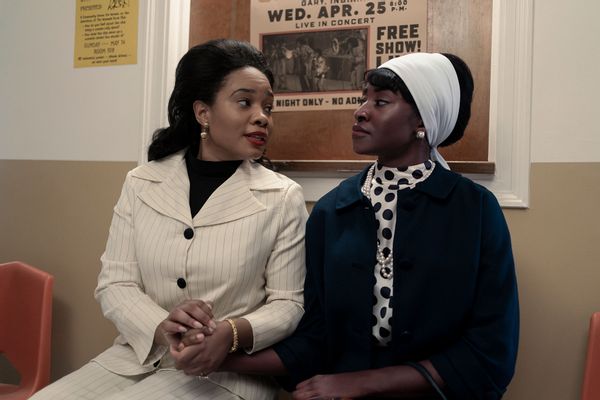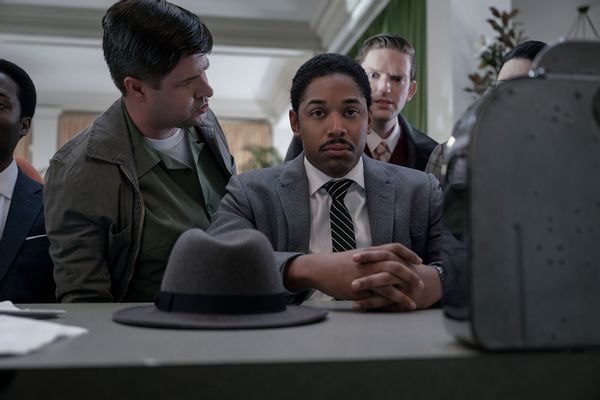
Genius is a designation tossed around too lightly in the modern age. And yet some understand it to describe the type of revolutionary thought that can lead to societal and cultural transformation. Not always — and not usually. History is awash in unsung geniuses whose fame was built in whole or part on others’ intellectual discoveries and strategies, men and women left out of history books or barely mentioned.
The first installment of National Geographic's “Genius” anthology, the one devoted to Albert Einstein, addresses this by gazing at Mileva Marić, the theoretical physicist’s first wife and intellectual muse.
“Genius: MLK/X” follows suit by glancing at Coretta Scott King’s (Weruche Opia) influence on her husband Martin (Kelvin Harrison Jr.) reminding us at regular intervals of the aspirations she put aside to support him. Betty Shabazz’s (Jayme Lawson) path is similarly paved, shown as the dutiful partner to the great Malcolm X (Aaron Pierre) who at a crucial point, tires of being subservient to the whims of the great Elijah Muhammad (Ron Cephas Jones, in his final role before his death).
By then Malcolm X is also questioning his place within the Nation of Islam and the larger Civil Rights movement. He understands that the Nation of Islam’s leader may envy and fear his influence, in the same way that white politicians like Strom Thurmond (Donal Logue) were desperate to discredit King's efforts. They are, in their own ways, bigger than the organizations they represent.
The limited series' main producer is Jeff Stetson, who envisioned what could have been if the two had a more sustained encounter in his play “The Meeting.” That piece, along with Peniel E. Joseph’s book “The Sword and the Shield: The Revolutionary Lives of Malcolm X and Martin Luther King Jr.” are this season's main sources. But its episodes tell us little about each man's wellsprings of inspiration and the very least about the people integral to forging their legacies.
In the main this "Genius" aims to present each icon’s “complex lives as husbands, fathers, brothers and sons,” according to the press notes, making its sustained focus on Coretta and Betty a matter of purpose. Stetson and the series’ guiding producers Reggie Rock Bythewood and Gina Prince-Bythewood also ensure Bayard Rustin (Griffin Matthews) is nominally afforded his due as the larger movement's driving organizational force. Compared to Colman Domingo's potent presence in Netflix's "Rustin" movie it's a wink, but it counts.

Some insist that critics should evaluate a work of art as it is instead of lamenting what it could or should have been. But with “Genius” a little complaining can’t be helped, since the narrative execution so rarely lives up to the title's promise — not even at its best. Such questioning is especially in bounds when the namesake subjects are two social justice giants whose legacies are perpetually diluted and twisted for purposes they never would have supported.
Conservatives love to quote lines from King’s “I Have a Dream” speech from the 1963 March on Washington when making their cases against diversity and inclusion. “Genius” shows Harrison’s King delivering that speech, strategically forgoing the dream-weaving to feature the line voicing his “conviction that there will be a better future ahead when negroes are finally free.”
We see him anguishing over what he’ll say in hours leading up to the famous speech, and considering the warning from John Lewis (Ja'Quan Monroe-Henderson), then the president of the Student Nonviolent Coordinating Committee (SNCC), that the March on Washington was in danger of simply becoming the March in Washington – words he paraphrased from Malcolm. Lewis also spoke that day, and more forcefully than the headliner, but we don’t see his contribution. The headliner is the genius, not Lewis.
Fewer right-wingers can or would cite Malcolm X verbatim. But any of them might point to Don Hogan Charles’ photo of him peering out of his window while holding an M1 carbine. Pierre recreates that frame in a late episode of “Genius” along with the circumstances leading to it: Malcolm and Betty’s home had been firebombed. Malcolm frequently insisted on Black people’s right to defend themselves, as depicted in “Genius” in response to Los Angeles police gunning down a group of men in a Los Angeles mosque.
These touchstones, along with most of the tandem arcs in King’s life, are well-documented. But these landmarks are evidence not of their genius, but their fame, which an alien might deduce from their presence in millions of memes, monuments, and T-shirts.
“Genius: MLK/X” opens with another image telling its subjects’ story, of their brief meeting on Capitol Hill on March 26, 1964, to attend the Senate debate on the Civil Rights Act of 1964. It was the first and last time they’d encounter each other in person. From there the series does the standard rewind to their childhoods, establishing their parallel life paths. King was a minister’s son who earned advanced degrees at East Coast institutions before entering the ministry.
Meanwhile the man once known as Malcolm Little grew up in poverty before moving to New York where he became a con artist. He’d eventually be arrested in Boston and convicted on charges related to burglary. His education was self-administered in prison after converting to Islam.
Near the end of each man’s life, their views were closer than ever – a product of experience and transformative genius. One wonders what type of story might have come out of tracing their ideologies not through their most famous moments, but what came afterward.
Not long after Malcolm X met King, he made his pilgrimage to Mecca, followed closely by visits to other African countries and stops in Paris and the U.K. There, Malcolm decried European and American imperialist oppression in the Congo. The series doesn't take us on these influential voyages or connect them to Malcolm’s intellectual or spiritual evolution. His Hajj is barely mentioned. But I suppose that would require a bigger budget and, more to the point, a dedication to mapping genius.

During the same timeframe King would appeal directly to President Lyndon Johnson to ease the passage of the Voting Rights Act in 1965, only to alienate Johnson not long afterward by publicly opposing America’s war in Vietnam.
When an assistant triumphantly relays the news from a Gallup poll reporting that 66 percent of Americans viewed King unfavorably after he came out against the war, Lyndon Johnson (John C. McGinley) wonders aloud, “How do you go from Nobel Peace Prize winner to the most hated man in America?”
Attempting to answer that question could have made for a stunning story, along with posing some version of the inverse about Malcolm X – how was one of the most feared activists in the 20th century remade into one of the most prophetic and respected?
That answer rests in Malcolm X’s way of interpreting the steering tenets of Western civilization and turning them on his oppressors to ask why truths held to be self-evident don’t apply to Black Americans or other colonized peoples. But that would be uncomfortable and take a full eight episodes by itself. “Genius” doesn’t afford him that grace, which would have been slightly radical by mainstream media standards. If they had done that task well, the audience may have been pleased to understand Malcolm's political brain, and King as a strategist, without denying them their humanity or pandering to those who would rather be reassured about what they symbolized.
“I think the only way one can really determine whether extremism in the defense of liberty is justified, is not to approach it as an American or a European or an African or an Asian, but as a human being,” Malcolm X told an Oxford audience in 1964.
“If we look upon it as different types immediately we begin to think in terms of extremism being good for one and bad for another, or bad for one and good for another,” he said. “But if we look upon it, if we look upon ourselves as human beings, I doubt that anyone will deny that extremism, in defense of liberty, the liberty of any human being, is a value.”
Modern activists have expressed their versions of this opinion when speaking out about the crisis in Gaza or other places in the world where a strong power oppresses a weaker one. A better series might have made it simpler to connect those dots, since Malcolm X’s views are echoed in the work of social justice advocates worldwide.
Those same people would likely argue that while King sought equality, he also believed attaining it required advocating for labor rights and fair housing. He also voiced disdain for white moderates more “devoted to ‘order’ than to justice,” as he observed in his famous letter from Birmingham jail, and his anti-war stance in “Beyond Vietnam.”
In one “Genius” scene Pierre’s Malcolm looks at a news report promoting the March on Washington and quietly describes it as a political coup for John F. Kennedy, not the Civil Rights movement. “If he has that many negroes parading, and the bill passes, the fight will be over,” he says. “Even if nothing changes, it’ll look like a win.”
One wonders what insights the real Malcolm X would offer in response to hearing this while watching “Genius” purport to explore his genius. That would be eye-opening.
New episodes of "Genius" premiere at 9 p.m. on Thursdays on National Geographic and stream the next day on Disney+ and Hulu.







